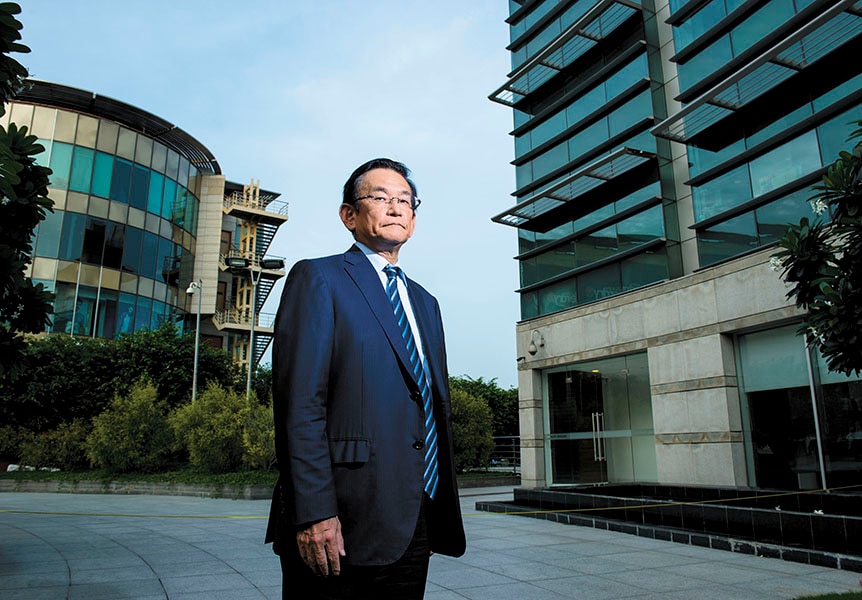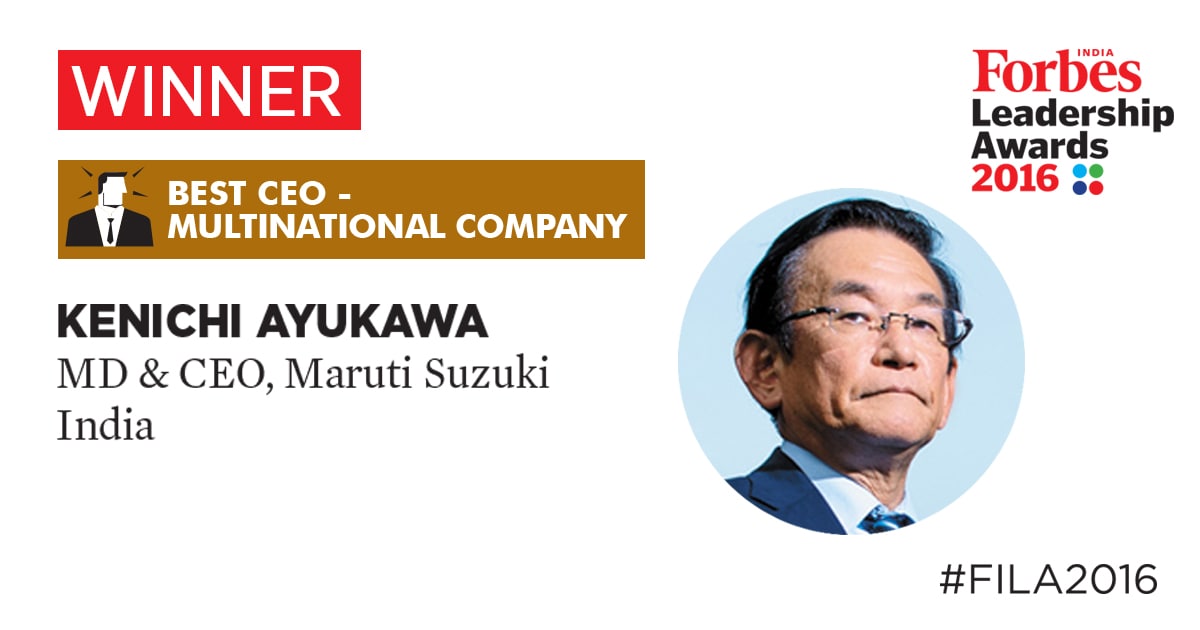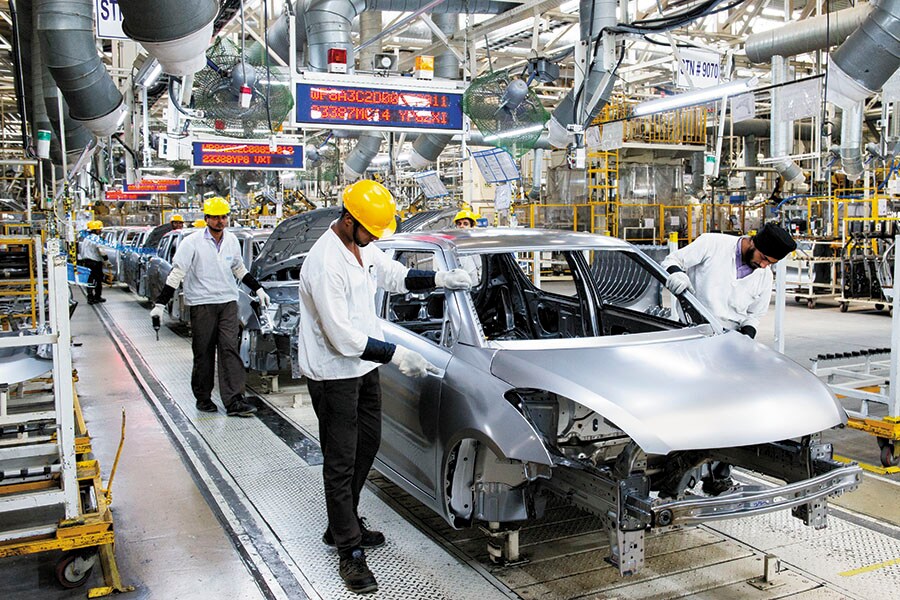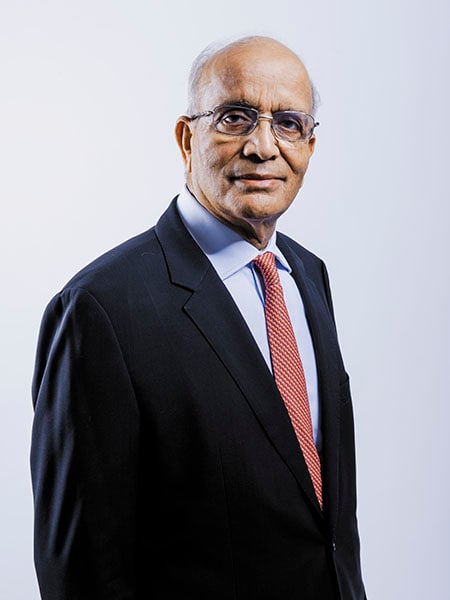Meet Kenichi Ayukawa: Maruti Suzuki's driving force
Kenichi Ayukawa's management philosophy—a mix of Japanese and global practices—is helping Maruti Suzuki achieve unprecedented success


 Kenichi Ayukawa’s management style is that of empowerment. He regularly interacts with the union and his employees
Kenichi Ayukawa’s management style is that of empowerment. He regularly interacts with the union and his employees
Image: Amit Verma
Kenichi Ayukawa typically likes to spend most of his Sundays playing golf. But on May 29 this year—also a Sunday—putting was far from his mind. Instead, the managing director (MD) and CEO of Maruti Suzuki India was rushing to Manesar in the Gurugram district of Haryana. A blast in a moulding machine at auto component maker Subros’s plant had triggered a huge fire. While there were no casualties, the fire, which raged for three hours, gutted the factory which manufactures vehicle air conditioners.
Ayukawa was at the plant, even as the fire was being doused, to understand the extent of the crisis this development was creating for Maruti Suzuki. After all, 90 percent of the plant’s output catered to the auto major’s needs. By Monday afternoon, both Maruti Suzuki’s factories—one each at Gurugram and Manesar—came to a standstill. “Initial estimates suggested that it would take at least three to six months for Subros’s Manesar facility to become operational,” says RS Kalsi, executive director (marketing and sales) at Maruti Suzuki. “Such a scenario would have been disastrous for us as our daily output was 5,500 vehicles and some of our new models, such as Baleno and Brezza, were in good demand with their waiting period already stretching to 30 weeks.”  Ayukawa, however, had other plans. He set up his base in Manesar, brought together all the stakeholders, including suppliers and the manufacturing team, liaised with Subros’s Japanese partner Denso and worked towards getting the plant up and running. “He formed a tightly-knit team that worked cohesively. He reviewed the progress on alternate days and in two weeks, the plant was operational,” says Kalsi. This ensured that Maruti Suzuki’s loss of production was minimal (it managed to resume operations in a couple of days by procuring supplies from Subros’s other facilities) and its momentum in the market was largely intact.
Ayukawa, however, had other plans. He set up his base in Manesar, brought together all the stakeholders, including suppliers and the manufacturing team, liaised with Subros’s Japanese partner Denso and worked towards getting the plant up and running. “He formed a tightly-knit team that worked cohesively. He reviewed the progress on alternate days and in two weeks, the plant was operational,” says Kalsi. This ensured that Maruti Suzuki’s loss of production was minimal (it managed to resume operations in a couple of days by procuring supplies from Subros’s other facilities) and its momentum in the market was largely intact.
“It is a very Japanese way of working. When there is a crisis, you do not sit in office, but go to the site, see for yourself and take a decision,” says RC Bhargava, the 82-year-old chairman of Maruti Suzuki and recipient of the Lifetime Achievement award at the 2015 Forbes India Leadership Awards.
It helps that Ayukawa, a 36-year Suzuki veteran, is no stranger to crisis management. He took charge of Maruti Suzuki in April 2013 at a time when India’s largest car maker was going through its worst period. Its labour relationships were floundering after a human resources (HR) executive was killed by workers at its Manesar plant in July 2012. The company’s market share in the passenger vehicle segment had touched an all-time low of 39.44 percent. Poor employee morale and lack of new products to address evolving but fast-growing product segments threatened the company’s leadership position in the market. Ayukawa was unfazed by the challenge. “We are a manufacturing company. If production is affected, we cannot supply to the customers. Labour relationship is critical. After the unfortunate event in 2012, we could not produce for a month,” Ayukawa tells Forbes India during an interview in late September at his office in Delhi’s Vasant Kunj. To begin with, he focussed on building bridges with the workers through better communication. He wasn’t overly concerned about regaining market share at the time. As he recalls, “I believed that by producing good products, we can recover our market share and work was already on for launching some very interesting products. That gave me confidence.”
Ayukawa was unfazed by the challenge. “We are a manufacturing company. If production is affected, we cannot supply to the customers. Labour relationship is critical. After the unfortunate event in 2012, we could not produce for a month,” Ayukawa tells Forbes India during an interview in late September at his office in Delhi’s Vasant Kunj. To begin with, he focussed on building bridges with the workers through better communication. He wasn’t overly concerned about regaining market share at the time. As he recalls, “I believed that by producing good products, we can recover our market share and work was already on for launching some very interesting products. That gave me confidence.”
Three fiscals later, his confidence stands validated. Maruti Suzuki’s passenger vehicle market share (as of March 2016) in India has risen sharply to 46.79 percent. Sales are up to Rs 56,350 crore (compared to Rs 42,413 crore in FY13) and profits have almost doubled to Rs 4,571 crore (from Rs 2,392 crore). Margins have risen too. The operating profit margin is at 15.93 percent (as against 10.04 percent) and net profit margin is 8.11 percent (from the earlier 5.61 percent) return on capital employed rose to 25.70 percent from 14.20 percent in FY13.  Maruti Suzuki has launched a series of new cars in India and is seeing robust growth. In September 2016 alone, it sold 1.37 lakh units, the highest ever monthly sales in its history
Maruti Suzuki has launched a series of new cars in India and is seeing robust growth. In September 2016 alone, it sold 1.37 lakh units, the highest ever monthly sales in its history
While Ayukawa attributes this success to good products, Maruti Suzuki’s dual channel strategy (the company launched Nexa—a dedicated sales channel for premium cars—in July 2015) also deserves a hat-tip. It was fraught with risks but Ayukawa decided to bite the bullet. “We wanted a new approach to reinvent ourselves,” he says of the Nexa plan. “The challenge made things interesting.” Maruti Suzuki opened 125 Nexa outlets in nine months and, by the end of FY17, around 250 of them will be in operation. “Our second channel [Nexa] will have as many dealers as Mahindra or Tata,” he adds.
This is a popular view. “In the last three years, Maruti Suzuki has put customers at the centre of its strategy with a clear focus on product and strategy,” says Abdul Majeed, automotive partner, PwC India. “It has been agile in launching products that addressed changing customer preferences. What worked well was its innovation in distribution strategy —[in the] setting up of Nexa.”
While Maruti is a market leader, it was never considered a technology frontrunner. It was, in fact, a technology laggard, a weakness that Hyundai exploited to gain market share when it launched its operations in India in the late 1990s. Ayukawa changed this perception somewhat when the company launched the auto manual transmission (AMT) with its Celerio model and began fitting it into Alto, WagonR and Dzire. AMT offers drivers the comfort of an automatic transmission without compromising on fuel efficiency and is at least Rs 1 lakh cheaper than traditional automatic gear versions. Most of the other car makers have now followed suit.
There is little doubt that the soft-spoken Ayukawa has made a significant impact. “He has set the base for future growth and the only thing that is in our way today is capacity constraint,” says Bhargava. “That will be taken care of once our Gujarat plant becomes operational in early 2017.”
Born in Nagasaki in 1955—his father survived the 1945 atom bomb attack as a young boy—Ayukawa aspired to become a scientist. “The moon landing triggered my interest in science, especially space,” says Ayukawa. He even became a member of the astronomy club at his school. His tryst with science ended soon thereafter and he pursued a degree in law.
After graduation, Ayukawa joined Suzuki at the Japanese car major’s Hamamatsu headquarters in the HR department. “I didn’t like it. I wanted to do much more than just taking care of people,” says Ayukawa. But he hung on in that role for eight years and the lessons during that period proved critical while dealing with the challenges faced in India. “I realised that I could manage people well as long as I communicate directly and honestly,” he says.
This came into play when Ayukawa landed in India on July 19, 2012, just a day after the HR executive was killed at the Manesar plant. Ayukawa—who, at the time, was on the board of Maruti Suzuki, based in Japan—spent the next month sorting out the problem by improving communication, among other things.  RC Bhargava, chairman, Maruti Suzuki
RC Bhargava, chairman, Maruti Suzuki
Today, as MD and CEO, the language barrier does not prevent him from meeting the union and workers once a month. “He has made it a practice to communicate with workers regularly and that has really helped,” says Bhargava. The result: The workers are more involved than before. During FY16 alone, over 6.98 lakh suggestions were received from employees leading to a potential saving of over Rs 280 crore, according to the company’s latest annual report.
Before assuming his India role, Ayukawa had a stint in finance between 1988 and 1993, and spent the next decade in global operations this included handling various markets in Europe and as CFO of the US operations before heading Suzuki in Pakistan between 2004 and 2008. His international exposure ingrained in him the ability to understand and respect local management practices. “His ability to absorb and learn about the way Indians think and decide is critical for his success,” says Bhargava. “If he had insisted that he will run the operations in a very Japanese way, it would not have worked. In India, the more foreign you are, the more difficult it is to succeed.”
Bhargava cites the example of a proposal by the parent Suzuki for Maruti Suzuki to own and operate dealerships in India. This is a practice in Japan and in some other markets where Suzuki operates. But Ayukawa understood that this would not work in India and convinced the headquarters about the plan’s futility. Dealerships in India are typically independent of the company, and this would put them in competition with company-run outlets.
“His logic is simple. If Maruti Suzuki grows, it will ultimately benefit Suzuki,” says Bhargava. Not for nothing is the India business Suzuki’s largest and most successful subsidiary. Such is Ayukawa’s passion for the India operations that he has been attempting to get some of the company’s top executives a seat on the Maruti Suzuki board. “He may not have succeeded yet on this front, but he is clearly a man who can take a different view,” adds Bhargava.
His management style is that of empowerment. For instance, when the Brezza project was launched, CV Raman, executive director (engineering), was named chief engineer of the project. “While being closely involved in the project, he left it to me to take all the major decisions. This is not the way the Japanese typically operate,” says Raman. But it proved effective in India: The compact SUV Brezza has emerged a big hit.
Ayukawa is also gradually ramping up R&D expertise among the Indian team so that more of the product development work can be done in the country. “He gets us the budget. He understands that by virtue of being close to the customers, the Indian team is well-placed to deliver good results,” says Raman. “This will help even as our Rs 2,000 crore product development facility at Rohtak goes on stream soon.”
Shop-floor workers have started getting used to their MD and CEO observing their work from a distance. Sometimes, he even walks up to them to understand what they are doing. “He is very informal and [not the] least hierarchical,” says Kalsi. He also visits dealers and talks to existing and potential customers. “I would like to understand things for myself,” says Ayukawa. This is a lesson he learnt from Osamu Suzuki, chairman of Suzuki Motor Company. “He was heading the company when I joined in 1980 and he is still my boss 36 years later,” he says. “Even today if I meet him, he is certain to ask how many times I visit the plant in a week.” Ayukawa does so at least three times a week.
Ayukawa’s face rarely betrays any emotion, however dire the news is. What angers him, however, is concealing bad news from him. “People want to report only the good things. I tell them if everything is good they do not need to report that. Tell me the problem so that we can find a solution,” he says. He now holds a weekly meeting with his top team on quality alone. Earlier these meetings would focus on numbers but today, the attention is on issues, peppered with plenty of arguments. “It [arguing] helps solve problems,” he adds.
Polite to a fault, Ayukawa’s demeanour hides a tough taskmaster. “He wants us to deliver as agreed,” says Kalsi. “He gets really upset if people respond to him without proper preparation.”
An avid reader of history (he has been poring over a lot of Indian history translated into Japanese), Ayukawa wants to rewrite Maruti Suzuki’s in India. He has already ensured that the company’s bitter past is behind it. Now, he is preparing it to take on the new challenges—shared mobility, alternate power trains, to name a few—that are being thrown up in the Indian mobility space.
First Published: Nov 23, 2016, 08:37
Subscribe Now